|
Zoom whiteboard notes from a piano student's lesson A student asked me questions on practicing. Do I practice every day, how long do I practice, when do I practice, what do I practice? How do I keep my enthusiasm for drumming year after year? Here are my answers.
As many people know, I took up the drums at age 50 after an adult student challenged me by saying I had no idea how difficult it was to learn as an older adult. I took the challenge. So, this blog is about my percussion practicing. (When my musical colleagues ask why I started drumming I tell a more colourful story that involves my misperception that drumming would be a cheaper mid-life crisis solution than buying a red sports car.)
If I can help and encourage you on your musical journey, call me. David aka "sticks Story" PS. I now cart my drums around in a red Cadillac. Not quite a sports car, but more drummer friendly.
0 Comments
Fanny Waterman was a legendary piano teacher in the UK who died in 2020 at the age of hundred. She was big on rules in the piano studio. My responses are lettered.
The following ten practice rules are modified from her book. 1. Sit straight with your fingers rounded. 2. Practice each day. a. Ms. Waterman lived in a simpler time. However, without regular practice, progress is difficult. Therefore, it is important that the student’s practice time is aligned with their ambitions and goals. 3. Before practicing new pieces, clap and count aloud the rhythms within. a. Use a metronome to keep your counting honest. 4. Write in the appropriate fingering and then stick to it. Different hands will require different solutions. a. Begin by following the fingering given. 5. Begin a new piece hands separately, then hands together. 6. Play slow enough to eliminate or minimize errors. a. In my own practice I note the tempo that I play without making errors. Each practice I begin at this tempo. Over time the music will speed up with minimal errors. 7. Master the rhythm before adding rubato and other rhythmic variations. 8. Never play through a mistake. Stop and correct it and then correctly repeat it numerous times before proceeding. 9. Pay attention to and fully understand the meaning of all the markings and text in the score. 10. Listen to how you sound. a. Self-assessment is difficult. Recording yourself is your best chance of accurate self-assessment. I have 15 years of drum practice recordings on my hard drive. (No kidding) I also practice in front of a mirror to check my posture. Fanny Waterman pg. 10-11, 1983 Note what is missing. There is no mention of listening to professionals play your pieces before you begin. This is my new rule. Listen and listen often. Know every note by heart. If I can help you, call me. David Kind and Wicked Learning Environments in musical study.
The subject of kind and wicked learning environments is a complex subject. This blog deals with just a small application of the insights of researchers. Namely, the use of feedback to make correct decisions. For deeper details, there are links in the Psychology today blog to the research papers and scholarly books. Definition: In a “kind” learning environment we learn from experience. For example, in sports we get immediate feedback because the distance between cause and effect is immediate. Furthermore, with help from the coaches, teammates, and others we progress through the predictable steps to mastery. Musical proficiency is similar. But, in “wicked” learning environments there is, for many reasons, no predictable path to mastery. This blog will only discuss the “kind” learning environment and the role of feedback. Feedback is crucial to learning a musical instrument. The popular late 20c. axiom, “feedback is the breakfast of champions” incapsulates this idea. Creating feedback loops in your practice is key to progressing with fewer setbacks and false starts. While in lessons the teacher provides immediate feedback, at home we are left to our own devices. Here are a few strategies skilled music students use at home.
The links below go to science. Psychology today has a list of scientific papers and links. If I can help you on your journey, call me. David References: Experience: Kind vs. Wicked | Psychology Today How to give and receive feedback effectively - PMC (nih.gov) The six skills of pianists
I don’t believe in talent. In my experience, all the so-called talented people turned out to be the hardest working, patient, and focused people of any cohort. However, they also had access to resources, like time and money to support their journey. Fortunately, there is a consensus around the core curriculum and its proper sequencing in formal piano studies.
If I can help you on your journey, call me. David Revised 2024 I take lessons and play in several musical groups. Only one group needs serious practice of specific pieces outside of rehearsals. However, all the groups are populated with active and retired professional musicians, like me, who expect that I will show up ready to play. Furthermore, the teacher I work with expects me to show up prepared. Some weeks I'm given a dozen pieces to learn. This is how I manage. I divide the pieces into two piles. The first pile consists of the pieces I can sightread. I never practice these. The second pile is divided into two further piles: the easy pile which consists of pieces that have passages that need the once over and the difficult pile that causes panic. I quickly dispatch the easy pile. In preparation for tackling the difficult pieces I repeatably listen to professional recordings of the pieces to have a clear aural understanding of the part. I then tackle the difficult stuff as follows.
Because I've prepared properly my heart is not conflicted. I'm at peace with whatever happens because I have done all that is humanly possible. However, sometimes, life gets in the way, and I will show up less than prepared. Then the banked musical skills of half a century kick in. You may not have half a century of experience to lean into, but as time goes by you will. If I can help you learn to practice, call me. David Revised 2024 Spend 15 minutes playing along with a recording.
Have fun. David How to maintain your jazz repertoire. I recently attended a Q&A with Lynn Seaton, bassist, and Regents Professor from North Texas State University. My question to him was on how he maintains his repertoire when jazz gigs are no longer 6 nights a week. His answer.
What a great answer. After he practices, he rehearses from his list. How simple is that? My plan is to follow his lead for a year and see what happens. I'm going to use the list below as a goal for revitalizing my repertoire on the mallets. Happy practicing. David 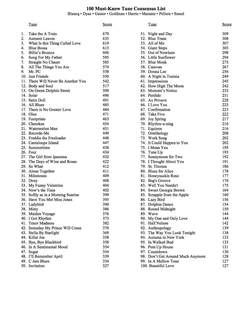 Angela Hewitt shares her tactics, strategies, and stories on how she keeps her musical memory strong. It is interesting to note that musical conservatories, like the Royal Conservatory of Music in Toronto, have developed curriculums that prepare the ground for developing and maintaining musical memory.
Link to the article: ‘Like sex and religion, we don’t like to talk about memory’: pianist Angela Hewitt on how she keeps hers in shape | Classical music | The Guardian Listening (5 minutes) Listen to professional recordings of the piece(s) you will be practicing today and then play your "party piece" or your "goto" piece.
Warm-up (10 minutes) Play your assigned scales, arpeggios, and technical exercises. Multiple repetitions are recommended. Repertoire (20 minutes) Play your piece(s) focusing on sound quality, phrasing, dynamics, and rhythm. I suggest working on small chunks Later, when you are close to the exam, you should run your program, without stopping, to build endurance. Sightreading (5 minutes) Theory (10 minutes) Ear Training (5 minutes) Review the requirements of the grade. Conclusion (5 minutes) Review an old favorite If I can help you, call me. David Piano Practice Guide What should I practice to learn piano? Here are some suggestions to help you learn piano:
Once again good specific advice. David What should a Royal Conservatory of Music piano student practice each week? Please answer in rhyming couplets.A Royal Conservatory student, practicing piano,
Should aim for consistency, not just a one-time show. First, warm up those fingers with scales and arpeggios, Then move on to pieces, to let the music flow. Technical studies like Hanon or Czerny, Can help to build dexterity and avoid any injury. Sight-reading and ear training, don't forget to include, These skills are crucial and can't be misconstrued. Challenging repertoire, should be in the mix, To push your abilities, and you're playing to fix. Lastly, review and refine, what you've learned so far, Take your time, be patient, it will take you far. So Royal Conservatory piano student, keep in mind, Practice regularly, and you'll see yourself shine. I may lose my mind. David How should I practice piano?
To practice piano effectively, here are some steps you can follow:
Have fun: Finally, make sure to enjoy the process! Playing the piano should be a source of joy and fulfillment, not stress and frustration. ---------------------------- Not bad. However, recording yourself is missing. David The teacher practices Jazz Last weekend I went to my first jazz jam with my Vibraphone aka my Malletkat GS Grand. We were a quartet of Tenor Sax/Flute, Vibes, Bass, and Drums. I survived with my dignity intact, but I’ve a few discoveries and confessions to share.
On the plus side, I knew all the tunes from years of playing and teaching jazz piano plus my jazz time and feel is strong. Here is the practice regime I began to follow to improve my jazz experience. Tune: Satin Doll by Ellington/Strayhorn
If I can help you with your jazz piano journey, call me. David BTW: In the era of Ai content generation, a human wrote this blog.
Super video demonstration but...
Let's consider the assumptions he is making about you the student/listener.
What is my job? I prepare students to understand and execute what he is talking about. The first thing we will do is assess your situation and then we'll draw up a logical plan.
Call me, David BTW: in 2017, I studied with Peter Martin in Rome Italy at the ROMA Jazz Workshop. I was in Rome studying jazz drumming with Greg Hutchinson. Greg played in Ray Brown’s last group. Peter is a great guy and a very skilled musician. When I grow up, I want to play piano like him. Updated 2024  How amateurs might up their game in rehearsals Jazz jamming is fun. Sight reading tunes each week is ok, but it is often difficult for the ensemble to improve because there will not be enough week to week repetition. So, I’m putting forth these suggestions.
The idea is that with weekly repetition, improvements can be heard. Bonus: folks will know what to practice between “jams” while flipping over two pieces each week will keep it fresh. Have fun. Learning tunes from a fake book is the hard way to go about things. Here is the Bill McBernie method of jazz practice in which you play by ear to multiple recordings. I could recall the basic outline of the tune "A foggy day" from playing it years ago. That helped. (If you don't know the tune, you must listen until you can sing along.) Below are the recordings and the order in which I played them. Some were played numerous times as I recalled more of the melody and figured out the key. The song was played in the keys of F, C, Eb, and Bb. I played along on vibes, not piano. I focused only on the melody . As the practicing progressed, I began to recall and understand the chords. Today I was playing it on the piano, from memory, with the chords. David
Here is one profile of a successful student who thrives on boundaries, discipline, and competition.
Mei diligently practices the following activities:
If I can help your Mei; please give me a call. David Piano students often ask me, “what should I focus on in my practice sessions?” Here is my reply.
Pieces, etudes, theory, sightreading, ear training, history, technique, ensemble skills
One of my adult students was asking tonight for some help planning his practice time. He is preparing for his Grade 8 piano exam. He is an engineer, a spreadsheet kind of guy. I'm sympathetic. Here is what we discussed. Warmup with sight reading. Use a metronome! Get into the zone. Now start practicing Technique with a 2-minute timer. Switch activities every 2 minutes = 15 minutes
Practice one short section to perfection =15 minutes Theory =10 minutes Ear Training = 10 minutes Review completed piece or pieces 10 minutes BOOM! one hour of accomplishment This may work for you. David Revised August 2022
David Revised August 2022 In the 1921 teaching manual “Principles of Pianoforte Practice” by James Friskin, he asserts that most students “simply do not hear all the sounds they produce”. I concur. I'm sure Friskin would be amazed at the ease with which a student can now record their practicing for self-evaluation.
Now the hard part, learning to love how we sound. I'll be honest, in the early days it will take a certain amount of fortitude. But push on in faith. You will be the first to hear the improvement and progress as you accumulate and listen to hundreds, even thousands of practice recordings. (In 13 years of playing drums I’ve 248 Gigs of mp3 recordings. It’s both humbling and gratifying to hear how one sounded a decade earlier, or even last year.) If I can help you learn to practice effectively, call me. David Revised August 2022 What should I practice at the piano?
What to practice is the perennial question? Here are some of the thoughts gleaned from decades of personal practice and observing countless students.
If I can help, call me. David revised August 2022 What is practice math? Kim practices 10 minutes a day and Rachel puts in 60 minutes a day. …and a year goes by.
Now let’s compare experiences. Kim is having the time of his life, he’s learned a few pieces, played in a recital, showed off to his non-playing friends. Rachel is also having the time of her life, she’s learned a few pieces well, played in a recital to great family fanfare, and showed off to her non-playing friends. They are both a success. Everyone is happy, including the piano teacher, because there was clarity of purpose explicitly communicated by parents to the teacher and the child at the commencement of lessons. David Jazz is primarily about rhythm and articulations, those tricky bits that are impossible to notate. Harmony is like math, fun for many and much easier to get your head around for most than rhythm and articulation. Or so beginners believe. But when the moment of truth arrives at a jam session theory goes mostly out the window and instinct kicks in. Adam Maness explores this theme in his video "Why do I still suck". Jorge Mabarak, on Facebook, puts it well, theory is a tool. I propose that rhythm is the key. And ear training is the secret. Here is a practice time breakdown that may work for you:
If I can help, please call me. David Revised September 2022
These ten activities will simplify the process of learning a new piece of music.
David Revised September 2022
David Revised September 2022 |
You've got to learn your instrument. Then, you practice, practice, practice. And then, when you finally get up there on the bandstand, forget all that and just wail. AuthorI'm a professional pianist and music educator in West Toronto Ontario. I'm also a devoted percussionist and drum teacher. Categories
All
|
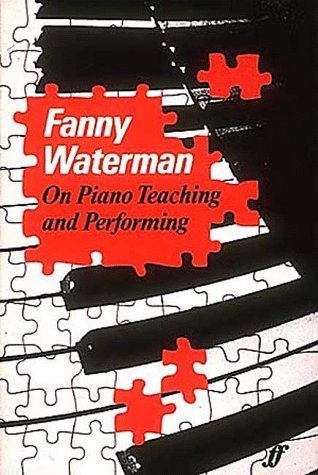
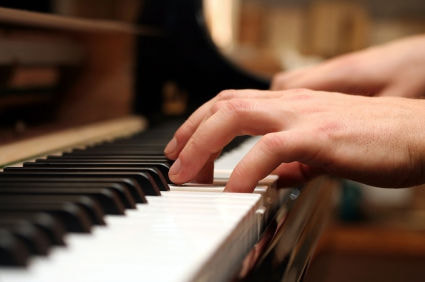
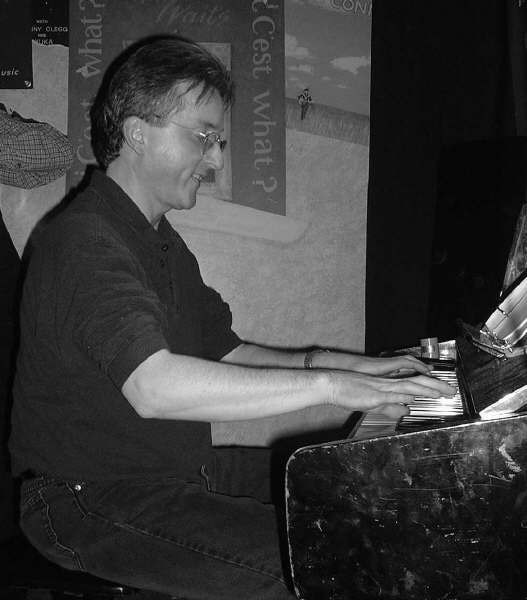
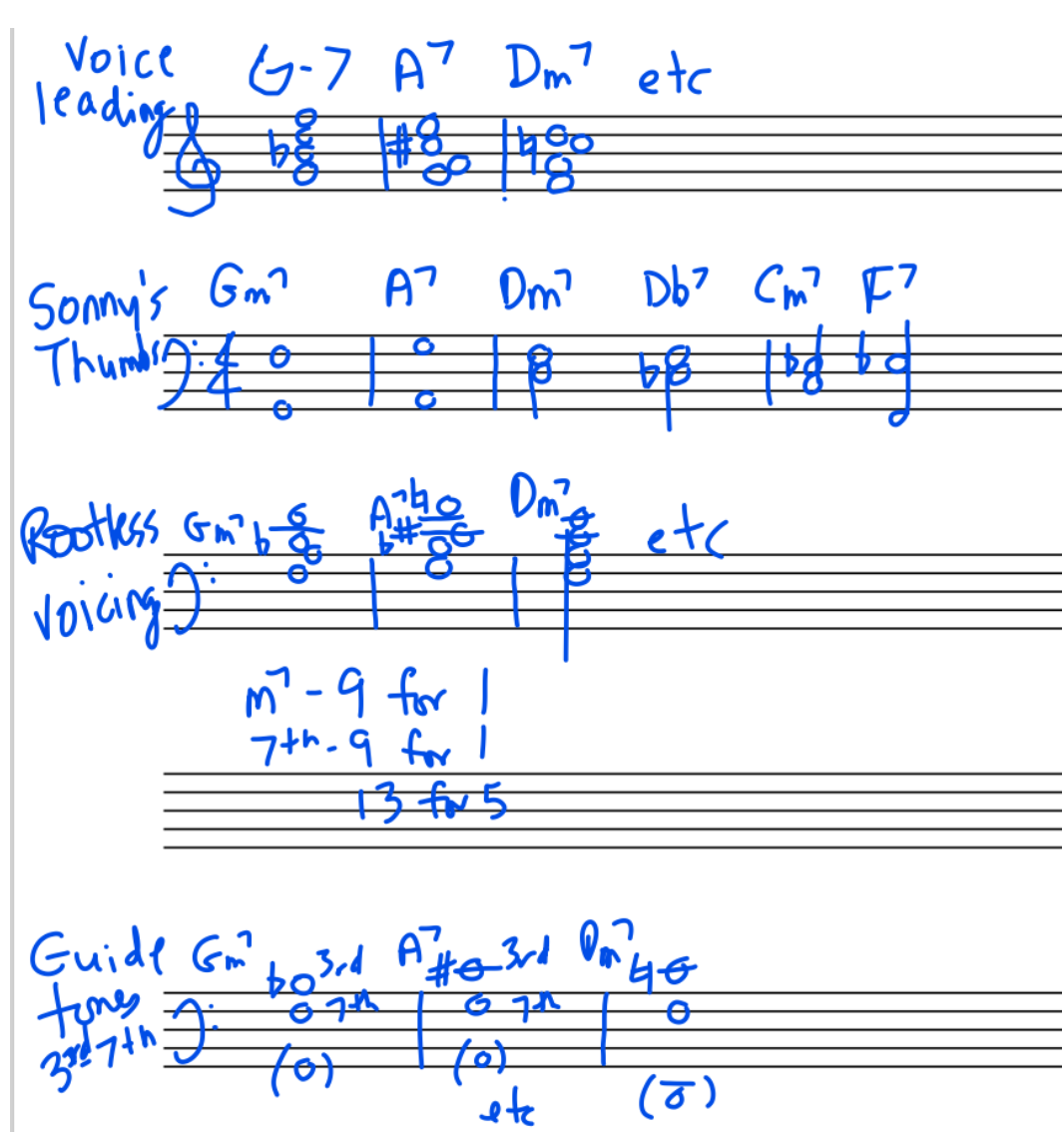
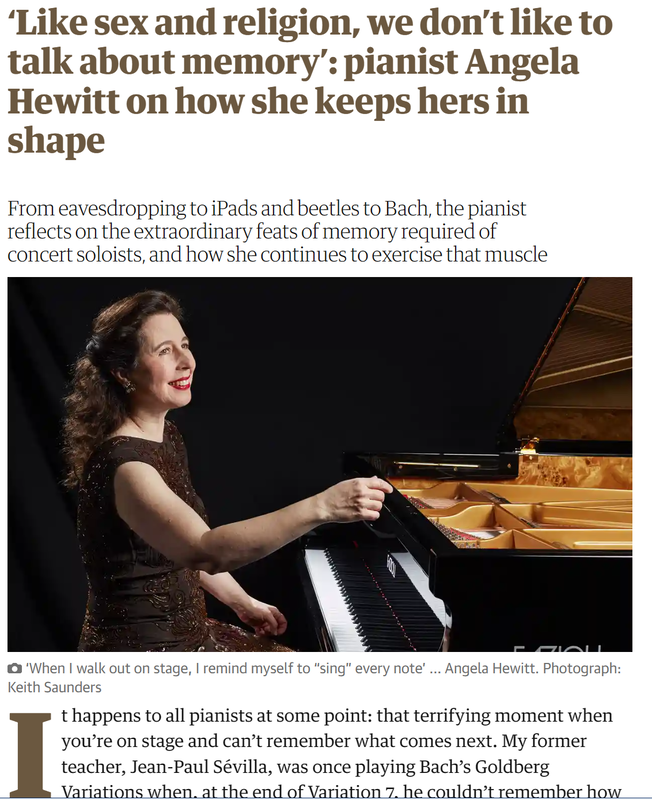
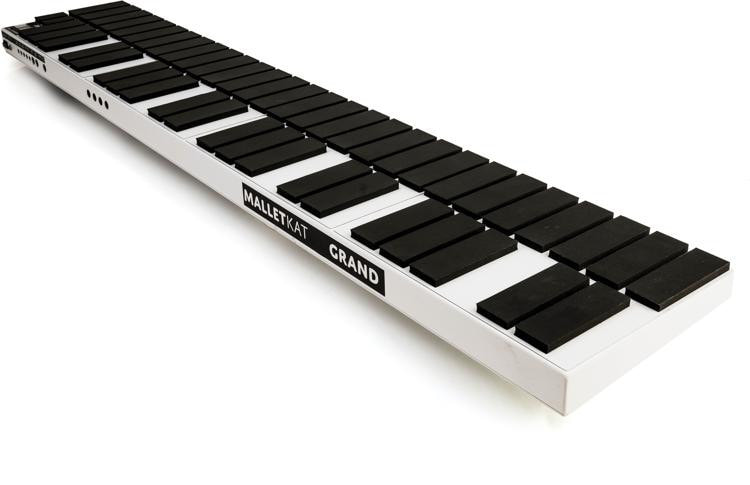
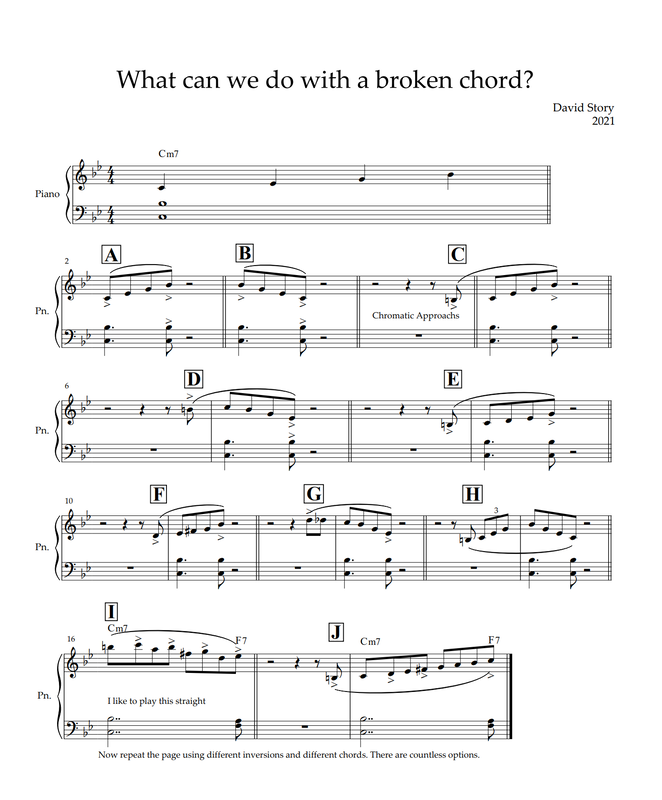
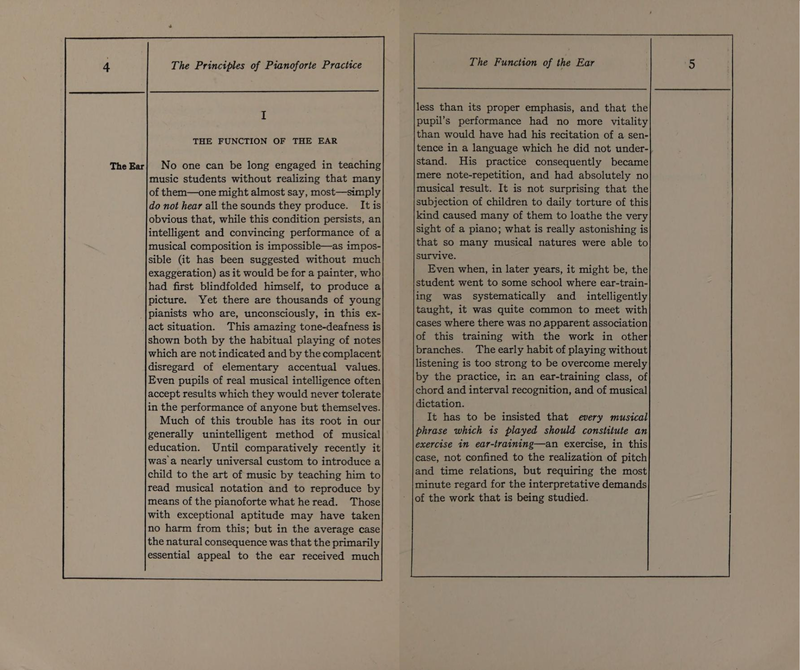
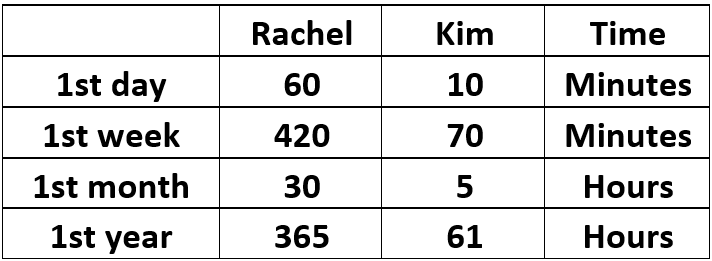
 RSS Feed
RSS Feed